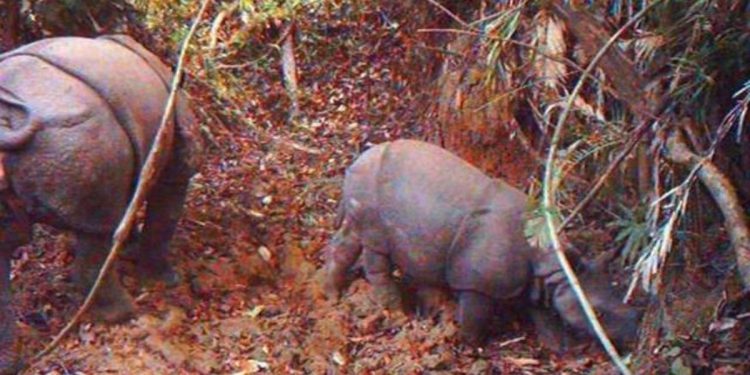On Wednesday, Indonesian authorities announced the arrest of six individuals suspected to be involved in an international rhino poaching network. Wildlife advocates are concerned that this ring could pose a significant threat to the existence of the critically endangered Javan rhinoceros, which is one of the five species of rhino with a population of just 76, according to the UK-based conservation charity organization, Save the Rhino. This organization is dedicated to protecting rhinos from poaching in Asia and Africa.
Last month, the police and the Forestry and Environment Ministry conducted a joint operation resulting in the arrest of six men. Yudhis Wibisana, the director of criminal investigation in Banten, revealed this week that one of the suspects had confessed to killing and selling 22 animals while another had admitted to killing four animals. AFP reported the statement made by Wibisana.
Officials have reported that a team of rangers from Banten’s Ujung Kulon National Park and the police are currently on a search for eight additional members of a poaching syndicate. The syndicate’s leader, Sunendi, was apprehended last year and was charged with a 12-year prison sentence along with a 100-million rupiah fine, equivalent to $6,135.
Authorities confiscated a variety of items commonly employed in the illegal practice of rhino poaching. These included homemade firearms, ammunition, gun powder, and even a steel sling noose. The police were successful in their efforts to prevent further harm to the endangered rhino population.
According to Rasio Ridho Sani, the head of law enforcement at the Forestry and Environment Ministry, the Javan rhino population is dwindling rapidly. He estimates that there are only around 80 mature animals left, a number that matches the estimate given by Save the Rhino. These rhinos are mostly found in the Ujung Kulon National Park, located in the western part of Indonesia’s main Java island. Sadly, Javan rhinos are facing the threats of habitat destruction due to deforestation and poaching activities.
Sani emphasized that the poaching of protected animals is a grave offense that has garnered international attention. He also stated that his team is collaborating closely with the Banten Regional Police to track down and apprehend the individuals responsible for the animal poaching crimes who were able to evade capture during the operation.
In a statement, Jo Shaw, the CEO of Save the Rhino, emphasized the devastating impact of poaching on the population of Javan rhinos. The recent arrests of poaching suspects serves as a reminder of the urgent need to protect these endangered animals from further depletion.
In a statement, Shaw expressed his devastation upon hearing the news that criminal gangs have allegedly killed one-third of the remaining Javan rhino population, putting the future of the species in danger. He acknowledged the positive development of the arrests made in relation to poaching networks around Ujung Kulon National Park, but emphasized the importance of prosecuting those responsible to the fullest extent of the law. Furthermore, he stressed the need for agencies to work together in investigating and dismantling the networks responsible for transporting rhino horns to the black market in China.










